The Securities and Exchange Commission asked a federal judge to dismiss its lawsuit against Ripple CEO Brad Garlinghouse and the crypto firm’s co-founder, Chris Larsen, according to court paperwork filed Thursday.
The move cancels a trial, scheduled for next year, that would have explored whether Garlinghouse and Larsen violated investor-protection laws by selling $1.4 billion of Ripple’s token, XRP — which the SEC labeled an unlicensed security when it sued the executives in 2020.
Ripple, in a press release Thursday, called the SEC’s request a “stunning capitulation by the government.”
Stuart Alderoty, the company’s chief legal officer — perhaps more pointedly — posted on X, formerly Twitter: “This is not a settlement. This is a surrender by the SEC.”
Next, attorneys for Ripple and the SEC will meet to discuss “what remedies are proper,” according to the court filing. That refers to an undetermined penalty for the portion of XRP sales a judge deemed illegal.
Judge Analisa Torres of the U.S. District Court for the Southern District of New York ruled in July that XRP is a security when it’s sold to institutional investors but not to the general public. The ruling puts Ripple on the hook for $728.9 million in unlicensed securities sales, but another $757 million doesn’t apply.
Ripple won’t be asked to pay back the full $728 million, Garlinghouse told The Wall Street Journal, because much of that went to overseas buyers, whom the SEC doesn’t oversee.
The SEC declined to comment to The Wall Street Journal, Reuters or CoinDesk.
"For nearly three years, Chris and I have been the subject of baseless allegations from a rogue regulator with a political agenda," Garlinghouse said in Thursday’s press release. "Instead of looking for the criminals stealing customer funds on offshore exchanges that were courting political favor, the SEC went after the good guys — along with our entire company of innovators and entrepreneurs — who are building a regulated business based in the U.S.”
Ripple said roughly 90% of its business is outside the U.S. now, with hiring focused in international markets. Indeed, the company agreed in May to buy Swiss crypto custody firm Metaco for $250 million.
Before the SEC’s suit, XRP ranked as the world’s third-most valuable crypto token. But it lost 60% of its value within a week of the legal action.
By dropping its case, the SEC “can proceed to appeal the Ripple decision much sooner — otherwise, they would have had to wait until the conclusion of that trial in the late spring," Katherine Kirkpatrick Bos, chief legal officer for Cboe Digital, tweeted.
Elliott Stein, a Bloomberg analyst, said the SEC perhaps “wanted to avoid bad facts coming out at trial of the individuals that could jeopardize the win the SEC got on direct institutional sales.”
The move would also allow the SEC to plow its resources into cases against larger crypto firms such as Coinbase and Binance, which the regulator has also sued, alleging securities violations.
Garlinghouse, for his part, told The Wall Street Journal he could have settled with the SEC years ago for less than Ripple spent in legal expenses but chose to fight “for the industry.”
“We always believed that the case was meritless, and that the SEC compounded its error by personally targeting Brad, who did absolutely nothing wrong,” Matt Solomon, a partner at Cleary Gottlieb Steen & Hamilton who represented Garlinghouse, told The Wall Street Jounal. “Faced with the prospect of having to prove its remaining claim against Brad in court, the agency was right to abandon it.”
Larsen, calling the lawsuit a “troubling attempt to abuse the rules in order to advance a political agenda to suffocate crypto in America, said the SEC should face “questions about the origin and motivation of this lawsuit.”
“It is a travesty that we were forced to defend ourselves from an ill-advised attack that was flawed from the day it was filed," Larsen said in Thursday’s press release.














